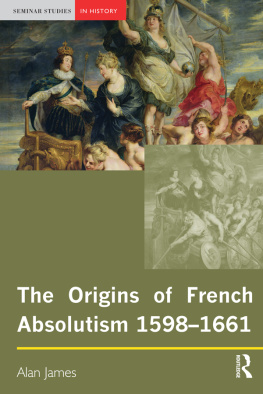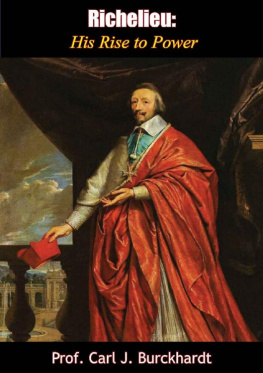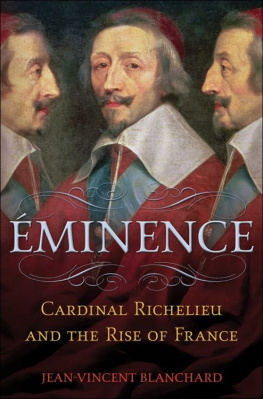Routledge Revivals
RICHELIEU
Richelieu
By
Karl Federn
With Twenty-six Illustrations and One Facsimile
Translated by
Bernard Miall
First published in 1928 by George Allen & Unwin Ltd.
This edition first published in 2018 by Routledge
2 Park Square, Milton Park, Abingdon, Oxon, OX14 4RN
and by Routledge
711 Third Avenue, New York, NY 10017
Routledge is an imprint of the Taylor & Francis Group, an informa business
1928 Taylor & Francis.
All rights reserved. No part of this book may be reprinted or reproduced or utilised in any form or by any electronic, mechanical, or other means, now known or hereafter invented, including photocopying and recording, or in any information storage or retrieval system, without permission in writing from the publishers.
Publisher's Note
The publisher has gone to great lengths to ensure the quality of this reprint but points out that some imperfections in the original copies may be apparent.
Disclaimer
The publisher has made every effort to trace copyright holders and welcomes correspondence from those they have been unable to contact.
A Library of Congress record exists under ISBN: 28024401
ISBN 13: 978-1-138-55267-8 (hbk)
ISBN 13: 978-1-315-12298-4 (ebk)
RICHELIEU

RICHELIEU
(Philippe de Champaigne. Muse Cond, Chantilly )
RICHELIEU
BY
KARL FEDERN
WITH TWENTY-SIX ILLUSTRATIONS AND ONE FACSIMILE
Translated by
BERNARD MIALL
( All rights reserved )
First published in 1928
Printed in Great Britain by
Unwin Brothers, Ltd., Woking
THE purpose of this history of Cardinal Richelieu is to show the living personality of the manto show it evolving, reacting to and acted on by other personalitiesand to portray the conditions in France as he found them and transformed them.
Within such a narrow compass it is not possible to give full particulars of the sources on which this biography is based. It is a remarkable fact that in French literature, apart from works by the Cardinal's contemporaries, there is no biography of Richelieu, and the great work projected by Gabriel Hanotaux has been left uncompleted. On the other hand, there are a great many volumes dealing with individual matters and problems, and these, with Hanotaux' work and Marijol's portrait of the man in E. Lavisse's Histoire de France , have been largely drawn upon, and especially the works of Avenel, Fagniez, Batiffol, and Magne. Richelieu's letters, reports, memoranda, dispatches, and what not have also, of course, been drawn upon, with his Political Testament and the Brief Relation of the Kings Achievements ; as well as the memoirs and sketches by his contempories, Tallement des Reaux, Bassompierre, Monglat, Brienne, Arnaud d'Andilly, Goulas, Montrsor, Fontrailles, Retz, La Rochefoucauld, Motteville, the "Grande Mademoiselle," and others. Little use has been made of Richelieu's so-called Mmoires, which, as Louis Bertrand has shown in vol. cxli of the Revue Historique (1922), may, indeed, have been written on his initiative, and may in part have been dictated by him, but which are, none the less, a compilation from heterogeneous sources, and revised in an arbitrary fashion by other persons; and hitherto only a very small proportion of the work has been critically sifted and examined.
The German literature concerning Richelieu is very scanty. The best thing as yet written in German is the very perspicacious portrait in Ranke's Franzsicher Geschichte der 16 and 17 Jahrhunderts ; but now, after sixty years, during which so many new sources have been discovered, it can no longer be regarded as sufficing. A very thorough work on Kardinal Richelieu , seine Politik im Elsss und Lothringen, by Wilhelm Mommsen, has lately appeared (Berlin, 1922), and this writer has published also a German translation of the Political Testament, with a comprehensive introduction; while Willi Andreas, in a volume of collected essays, Meister der Politik (Berlin, 1922) has given an excellent account of Richelieu's general activities.
Those readers who are interested in the further development of events in France after Richelieu's death may be referred to the detailed account in my book on Cardinal Mazarin (Munich, 1922).
K. F.
Illustrations
- RICHELIEU (PHILIPPE DE CHAMPAIGNE. Muse Cond, Chantilly. ) Frontispiece
Chapter I
The Monarchy and the Estates
RICHELIEU
THE transition from the Middle Ages to the modern period, which in France was accomplished in the sixteenth and seventeenth centuries, was nowhere so swift and so stormy as in that country. The heavily-armed noble, the knight, and the man-at-arms made way for the professional soldier; the feudal seigneur became a courtier; the strongly fortified, fortress-like castles, which but lately, in a century of religious warfare, had constantly to be guarded and defended against sudden attack, were transformed into refined and decorative buildings standing in spacious gardens, in the midst of flower-beds and well-trimmed alleys, enclosed by nothing more substantial than a fence; and a society came into being in which wit and culture united men of very different classes and conditions; while the frequently disrupted State, which had been a mere assemblage of separate provinces, became an organic unity. Many forces conduced to this transformation, many co-operating causes and intellectual currents that were fed from many sources, which, in a thousand ways, difficult to follow, impinged upon men's souls, altering their conceptions imperceptibly from day to day; and these changes were accompanied by grave and bloody political crises and economic revolutions. But whatever forces were operating under the surface and in the background, visibly, and on the stage of history, this change, induced and accomplished by a mighty impulse, was brought to its consummation in France of the Kingdom. Since the old dukes of Francia, the first of the Capets, had taken the field to extend their authoritymodest enough in the beginning, and for a time confined to the island city of Paristhey had conquered, and subjugated by a long struggle, full of vicissitudes, but marked by gradual and persistent progress, provinces of the old Empire, fiefs, and independent principalities, or had acquired them by inheritance, marriage, or treaty, and had added territory to territory until they ruled over a genuine kingdom. And this kingdom they retained through the Hundred Years' War with England, who, at that time herself still half French, and seeking to establish herself on the Continent, had held in fee or in dominion the greater part of France. They became what the German kings had never succeeded in becomingthe unifying, ruling, and predominant power. The same house ruled in France for a thousand yearsafter the elder branch had died out in the collateral linesand this unbroken legitimacy was of enormous importance in an age when legitimacy, antiquity, and tradition were esteemed above all things. Only once did it appear to be really threatened; in the wars of religion of the sixteenth century another family, the house of Lorraine, in the person of the Guise, seemed on the point of supplanting it on the throne, but Henri III averted the danger by assassination; and when a year later he himself was murdered, and the Valois line became extinct, Henri IV, one of the most gifted princes of the house which had already produced so many great administrators, succeeded once more in uniting the dismembered land. With him the Bourbon line ascended the throne.









